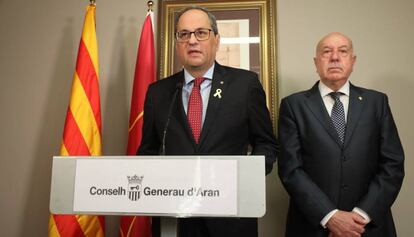Ahead of election, Catalan premier told to remove separatist symbols from public buildings
Electoral authorities remind Quim Torra that institutions have an obligation to maintain political neutrality

The National Electoral Commission (JEC) has given Catalan premier Quim Torra 48 hours to remove all esteladas – the unofficial flag adopted by supporters of Catalan independence – and yellow ribbons – a symbol of support for the separatist leaders currently on trial in Madrid for rebellion – from buildings belonging to the regional government.
The yellow ribbons and estelada flags are partisan symbols used by specific parties that are running in the elections National Electoral Commission
According to the JEC, these symbols may be “legitimately used by political parties in their electoral campaign material, but not by public authorities, as they must maintain rigorous political neutrality.”
The ruling comes ahead of a snap general election that has been called for April 28, and municipal, regional and European elections on May 26.
During a six-hour meeting, the members of the JEC agreed that “the yellow ribbons and estelada flags are partisan symbols used by specific parties that are running in the elections.”
In its decision, the JEC said that electoral regulations “ban public authorities – which are at the service of all citizens – from taking sides in elections,” adding that only private citizens, “not governments,” are protected by freedom of expression.
Last Wednesday, the center-right party Ciudadanos (Citizens), which opposes Catalan independence, called on the regional government to take down the symbols, arguing they violated the principle of political neutrality of public institutions. When the Catalan chief of foreign affairs, Alfred Bosch, refused, the party filed a complaint with the JEC.

This is not the first time that election authorities have issued a decision on pro-independence symbols in public buildings. During the regional Catalan elections of December 2017, the Barcelona electoral commission reached the same conclusion and forced many City Halls to take down yellow ribbons from their buildings, as well as signs with messages such as “Free the political prisoners.”
In 2016, the Supreme Court ruled that the estelada was a “partisan” flag and, as such, could not be displayed on public buildings, especially during an election campaign.
Rising tensions
The presence of yellow ribbons in public spaces in Catalonia has been a growing source of tension and conflict. The symbols represent support for the former heads of the pro-independence associations Jordi Sànchez and Jordi Cuixart, and for politicians such as Catalan Republican Left (ERC) leader Oriol Junqueras, who, along with several other key figures from the previous regional government, have been in pre-trial custody since late 2017 for their role in the unilateral declaration of independence passed in the Catalan regional parliament.
But their presence on beaches, city squares and other public spaces, has proved to be a point of conflict. Catalans who oppose secession have been removing the symbols – in some cases in an organized and systematic manner. Last year, one woman allegedly had her nose broken by a man after an argument broke out when she removed some yellow ribbons.
In another case, a scuffle broke out when around 20 individuals began pulling out crosses left on the beach by activists from the pro-independence grassroots group Committees to Defend the Republic (CDR). A local man was hit in the neck with a cross, a woman received a blow to the head, and a councilor for the far-left CUP party said he was pinned down and kicked.
English version by Melissa Kitson.
Tu suscripción se está usando en otro dispositivo
¿Quieres añadir otro usuario a tu suscripción?
Si continúas leyendo en este dispositivo, no se podrá leer en el otro.
FlechaTu suscripción se está usando en otro dispositivo y solo puedes acceder a EL PAÍS desde un dispositivo a la vez.
Si quieres compartir tu cuenta, cambia tu suscripción a la modalidad Premium, así podrás añadir otro usuario. Cada uno accederá con su propia cuenta de email, lo que os permitirá personalizar vuestra experiencia en EL PAÍS.
¿Tienes una suscripción de empresa? Accede aquí para contratar más cuentas.
En el caso de no saber quién está usando tu cuenta, te recomendamos cambiar tu contraseña aquí.
Si decides continuar compartiendo tu cuenta, este mensaje se mostrará en tu dispositivo y en el de la otra persona que está usando tu cuenta de forma indefinida, afectando a tu experiencia de lectura. Puedes consultar aquí los términos y condiciones de la suscripción digital.









































